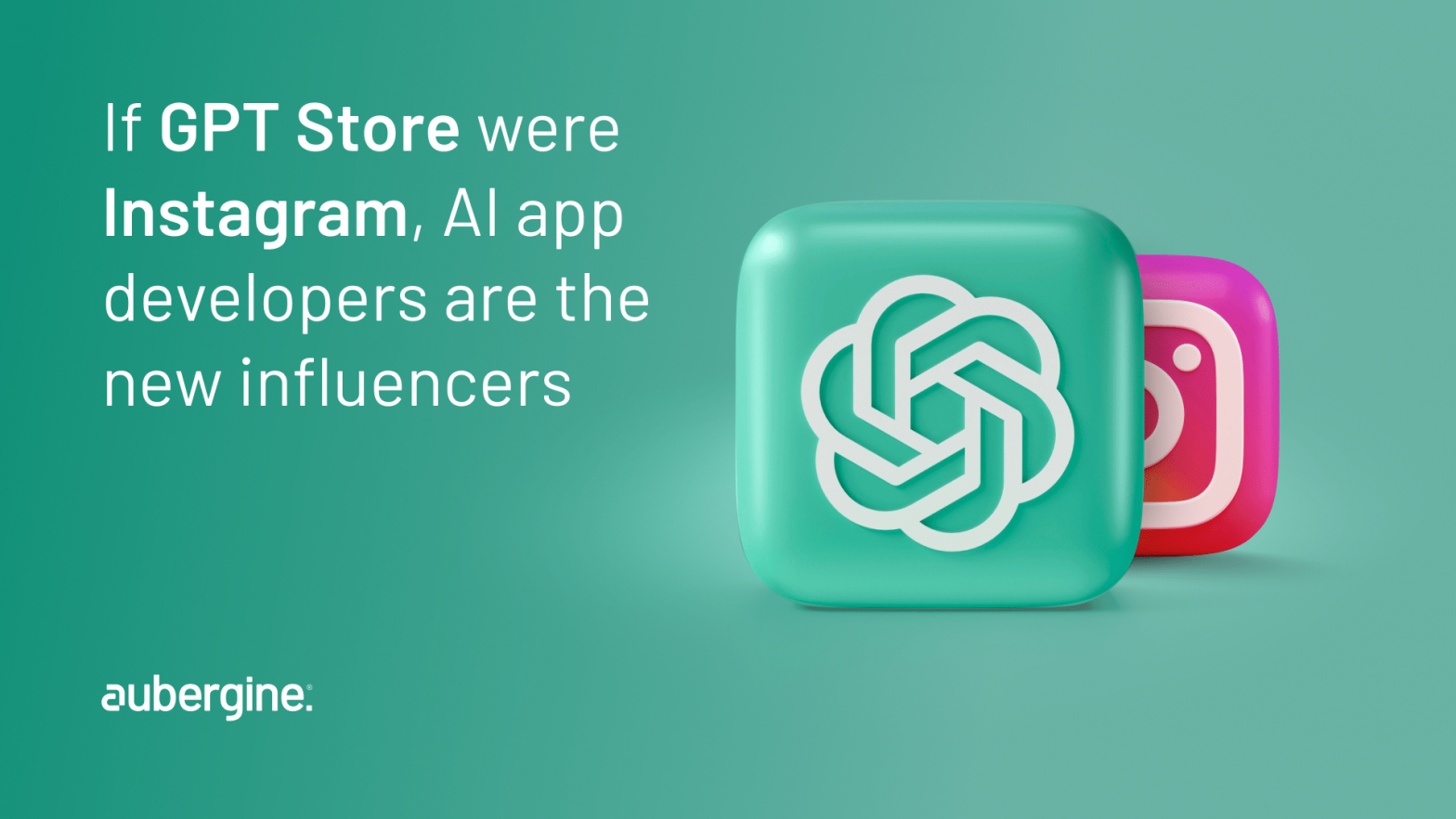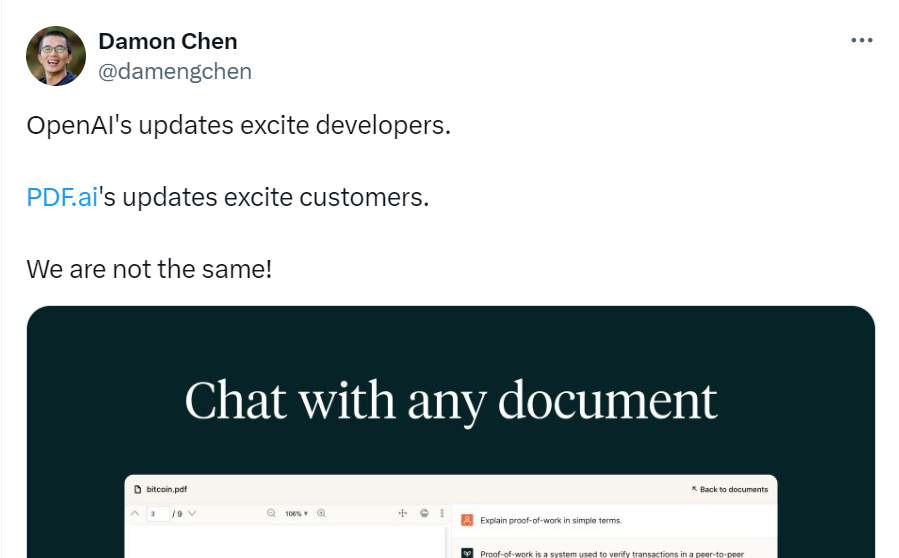
If the GPT store were the ‘Instagram’ of tech, are software developers the new influencers?
A.k.a – What happens to the software development industry if developers can monetize GPTs independently in an open-source ecosystem that the GPT store is promising to be?
With OpenAI launching its own GPT store – Many people are equating this time in tech to the times when giants like Google & Apple launched their App Stores. The 2 universes are completely different. But if OpenAI allows developers to monetize on the GPTs they train and sell on the GPT Store – We might be on the brink of a new horizon.
What do you think will happen if software developers, or anyone for that matter – trained a GPT well and sold that on the GPT store? And so it brings us to the question defining our tech zeitgeist –
A new chapter unfolds with the launch of OpenAI’s GPT Store, promising a revolution not unlike the golden tech rush we saw with the rise of Google and Apple’s App Stores.
This isn’t merely an extension of what we’ve known; it’s a leap into uncharted territories.
The intelligence of our world evolves faster than our own evolutionary biology. That’s the power of compounding technological impact. We still have 2 🙌hands like we did 1000 years ago, but there are at least a 1000 new things our hands🙌 can do today with access to a computer, that they could not back then.
So in a way, to be scared of AI is to be scared of evolution. Coming back to GPT store
It’s clear as day: technological advancements are not just about ‘new’ things; they’re about revolutionizing our daily lives. And with the advent of the GPT store, the lives of software developers are about to get a lot more exciting.
The way to make money with GPTs is by selling access to them. Just like when you buy apps from the App Store or Google Play, the folks who make these GPTs will get paid based on how many people use and like their ‘stuff’. As of now, there doesn’t seem to be a way to earn money through ads on the GPT Store.
But if you really think about it, only imagination is the limit. Because once, IG reels weren’t a thing. Wealthy Instagram influencers and young TikTok millionaires were not real, and ‘technology’ meant having a CPU at home.
To build a business on wrapping OpenAI interfaces into a standalone app is like an elephant in the tech room. Why? Because it’s the equivalent of building your dream house on land you don’t own.
For developers aspiring to make their mark in the GPT Store, picture this: you develop a groundbreaking GPT that becomes the go-to in the tech community. Then, out of the blue, OpenAI updates its terms, introduces new fees, or changes how services are accessed. Suddenly, the game changes, and not necessarily in your favor.
So, what’s the move? Dive into the GPT Store with both eyes open, and a strategy that includes diversification and adaptability.
Yes, the opportunity to become tech’s next influencer through the GPT Store is immense. But success in this space means more than just innovation and popularity; it requires an agile approach to navigating platform policies and market dynamics.
What developers do have on their side is not OpenAI. It is customer inertia:
Customers who find a product that reliably solves their problem are unlikely to switch to a more generic solution, even if it’s provided by OpenAI. This is particularly true for non-technical customers or those with very specific needs.
Example👇
OpenAI’s recent launch of features like “Chat with this PDF” is stirring up concerns among businesses that rely on OpenAI’s technology. Is it wise to build a business on OpenAI’s platform?
Let’s look at Damon Chen, the founder of PDF.ai. Despite widespread speculation that OpenAI’s updates could significantly impact his business, it appears he’s managing quite well.

To find an answer, I went looking to see what’s happening with the AI automation and AI augmentation technologies. And I found artisan.co – Artisan AI specializes in creating advanced digital workers, known as Artisans, designed to integrate seamlessly with human teams for end-to-end workflow automation.
These AI-powered digital workers, like Ava the Sales Rep, are not just tools but team members that can be onboarded in minutes without requiring technical skills.
Imagine this -Artisan’s digital workers can be integrated into wrapper apps to automate complex workflows, acting as an intelligent layer that adds value to existing systems and software.
My point – AI is a fertile market, but the plants are young. There are many myths floating around the internet about AI, and just GPT in general that intrigue me. And here’s my human effort to make sense of them.
Or a garden. Basically, anything that denotes fertility.
GPT store is fertile, because it allows you to discover tools that help you create things in the first place.
App Store, on the other hand, is like a market or a bazaar. Filled with ready-to-consume things—apps developed for specific tasks. You walk in, pick what you need off the shelf, and use it as is.
The GPT Store is more like a farmer’s market. Here, you’re not just buying food; you’re getting ingredients to cook up something unique. The offerings aren’t predefined solutions but components you can mix and match to create tailored experiences.
That’s what training the GPT into custom offerings on the GPT store is going to look like for developers.
It’s about breaking down the gates and letting the creativity flood in—democracy in action but for code.
Once, only artists like musicians or filmakers, or even painters were called ‘indie’ or independent. Soon, artists from the software developers community will be called ‘indie’ too. The trail of technological evolution is simple: Humans served tech for a long time. It’s time tech served us?
The open-source nature of GPT store allows it to. Software developers can now build indie businesses on top of AI. Even Techcrunch kind of agrees.
In fact, a state of open-source enterprise report from 2022 made a close prediction.
Basically, back in 2022, more and more businesses were already embracing open-source software. More IT leaders already prefer to work with companies that supported open-source projects. This shows how crucial open source is for innovation in tech.
A.k.a – open-source is not just for geeks in garages anymore. GPT store is going to bring back a trend we know has worked before.
It’s not new, because think back to WordPress. Today, 40% of the internet is hanging in WordPress’s backyard. It proves that sharing and collaboration could reshape the internet. And open-source + AI? The possibilities are realistically endless.
Because OpenAI believes in the open-source nature of things, It’s not in OpenAI’s interest to build niche solutions that compete with indie software developer AI startups. It’s in their interest to enable them.
Imagine being able to automate recurring codes.
Or, imagine: GPT could identify the components from the designs and write the code with the correct CSS hierarchy.
Wouldn’t life be beautiful?
Think of it like this – GPT could do all your dev chores. So you saved your mental energy for the best – thinking creatively, and building for innovation.
The journey has already started. GitHub Copilot is here.. It helps coders write clean code faster. The GitHub Copilot is powered by OpenAI’s Codex, a generative language model like ChatGPT.
(Psst – If you want to see GitHub Copilot in action, check out this video showcase of how it can help you translate strings in multiple languages).
Think of children playing in gardens. Of how much innovation exists in playgrounds.
And now think of software developers. With GPT enabling hyper-automation, software developers could finally play more often.
In other words, coders are like artists. Boundaries shape how they build. But what we often forget, is that programming isn’t just about writing code or picking frameworks. It’s about breaking down complex problems into solvable parts. And that’s stuff of the genius creative.
The idea that AI will replace programmers overlooks the real challenge: Understanding the problem space. This myth has a problem because it underscores that programming is not just about writing code—it’s about mastering the intricacies of the problems at hand.
The true challenge lies in breaking down complex problem spaces into manageable components that can be addressed through code or AI techniques. The moment “generative AI” can truly replace a programmer is when it can replicate the unique creativity that each individual brings as a human.
But AI and developers go hand in hand. For example, AllTrails.com whipped up a chatbot that dishes out hiking trail suggestions. Meanwhile, Khan Academy, the educational non-profit, launched a bot to tutor folks in coding. Over a recent two-month spree, OpenAI reported the birth of three million bespoke chatbots.
And for that being ‘smart’ (like gpt) is not enough. You have to be creative.
Like children playing in gardens.
Technology, with champions like the GPT store reshapes our work, elevates our lives, and, yes, even tickles our funny bones.
So here’s to embracing the future, with our wonderfully unchanged hands 🙌 and the boundless possibilities of technology.
Are you with me yet?
Read next: How Bloggen is transforming digital storytelling

